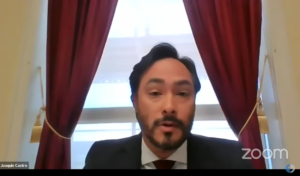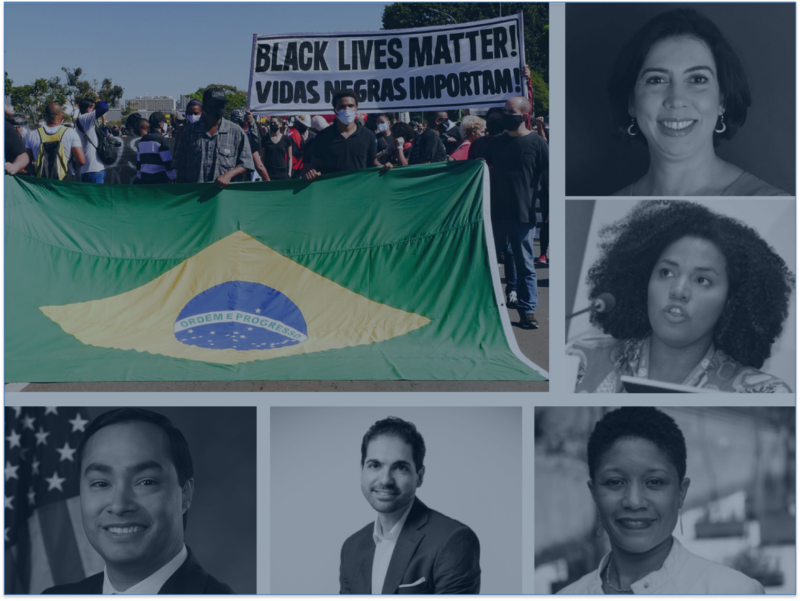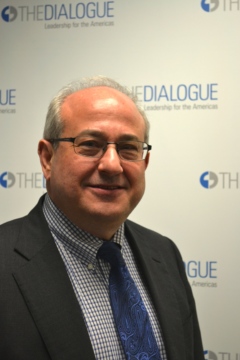
‘Campanha bizarra, cruel e divisiva’, avalia especialista americano
Presidente emérito do Inter-American Dialogue, Peter Hakim diz que maioria republicana sabe que Hillary é provável vencedora.
On July 23, 2020, the Inter-American Dialogue hosted “Race and Policing in the US and Brazil,” to discuss what the recent cases of police violence reveal about systemic racism in both countries. The webinar featured opening remarks from Joaquin Castro, US representative for Texas’ 20th congressional district, and insight from Alexandra Montgomery, director of programs at Amnesty International, Christen Smith, associate professor of African and African Diaspora Studies and Anthropology at the University of Texas at Austin, and Melina Risso, program director at the Igarapé Institute. The event was moderated by Michael Camilleri, the director of the Peter D. Bell Rule of Law Program at the Dialogue.
[caption id="attachment_98611" align="alignleft" width="300"] Representative Castro delivered opening remarks[/caption]
Representative Castro delivered opening remarks[/caption]
The recent killings of George Floyd, Breonna Taylor and others have prompted an overdue reckoning with issues of systemic racism and policing in the United States. The demands for police reform, accountability and racial justice have resonated worldwide, particularly in countries that face similar challenges, like Brazil. Congressman Castro gave the opening remarks. His comments highlighted the historical parallels of slavery and systemic racism that both the United States and Brazil must reckon with. Representative Castro also spoke to the alarming trend towards militarization that is occurring in the police departments of both nations. He concluded his remarks with a call to action: “We must come together to fix the underlying causes of systemic racism in both countries, such as access to education, disenfranchisement, and the lack of equal opportunity in order to better focus on one of racism’s deadliest symptoms: the disproportionate killing of Black and Brown people by the police.”
Smith addressed the transnational reality of anti-Black policing, which is rooted in the legacies of slavery across the Americas. She explained that while traditional cultural perspectives frame the United States and Brazil as opposites when it comes to conceptions of race, the two nations are much more similar than many would like to believe. Specifically, Smith noted that structural anti-Blackness and explicit and implicit biases are embedded in the criminal justice system in both nations. Additionally, she commented that stereotypical discourses in both nations have been euphemized as not being about Blackness. This sort of language around "colorblindness" is present in both the United States and Brazil. For example, she stated that “in Brazil, ‘favela or favelado’ and in the United States, ‘ghetto or urban,’ are terms used to signal Blackness and mark spaces as criminal and expendable, and people as killable.” Ultimately, Smith sees a transnational movement of abolition, demilitarization and the reallocation of police resources to social services as the best way forward for the United States and Brazil. The biggest impediment to these goals in both nations is political and public sentiment.
The transnational element to anti-Black policing that Smith highlighted helps explain why the Black Lives Matter (BLM) movement and calls to end systemic racism have reverberated beyond US borders. Montgomery commented that the BLM movement in the United States and activist movements in Brazil can use this opportunity to exchange tactics in order to face similar struggles. She also made reference to the rising number of police killings in Brazil, and how data collected by different states are not uniform, making it difficult to understand the immense scale of police violence. Instead, she posited two dimensions for analyzing police violence: 1) what the data says, and 2) how people living in Brazilian communities feel towards police. Montgomery explained that, “for Black people in [Brazil] it is clear...that [police] institutions are permeated by a vision that certain kinds of people are disposable and certain bodies are killable.” Montgomery also called attention to Brazil’s weak justice system and endemic culture of impunity as structural obstacles to greater accountability for police. The lack of accountability helps perpetuate the constant cycle of police violence.
[caption id="attachment_98608" align="alignright" width="300"] Speakers: top left, Smith; top right, Montgomery; bottom left, Camilleri; bottom right, Risso[/caption]
Speakers: top left, Smith; top right, Montgomery; bottom left, Camilleri; bottom right, Risso[/caption]
Risso expanded on Montgomery’s points, making clear that in Brazil, the state kills. Risso cited the fact that in Rio de Janeiro, 23 percent of total intentional killings are committed by police. In Sao Paulo, the number is 20 percent. Policing tactics within the country vary depending on the wealth and race of the community. Risso also explained that Brazilians must confront the issue of racism that is entrenched in their society, culture and police institutions, and that too often goes unaddressed. Brazilian President Jair Bolsonaro’s security policy has not confronted the issue of racist policing. Instead, his administration has dismantled arms control measures, effectively increasing the number of guns available to Brazilians. Additionally, Risso explained that Bolsonaro’s rhetoric has emboldened police officers’ license to kill without accountability or penalty.
The event ended with questions from the audience about the extent to which civilian and military police work together and whether better training should be considered part of the solution to anti-Black policing. To the latter question, panelists responded that policing is structurally anti-Black, and therefore training will always fall short in addressing the problems of systemic racism in policing. Smith and Risso both cited past attempts at police training in the United States and Brazil that failed to make any sort of change.
Presidente emérito do Inter-American Dialogue, Peter Hakim diz que maioria republicana sabe que Hillary é provável vencedora.
Michael Shifter fue entrevistado por Gerardo Torres de El Salvador sobre los temas más destacados en la agenda regional. Entre otros asuntos, Shifter habló sobre el futuro de la paz en Colombia, la crisis política y económica en Venezuela, y el impacto de las elecciones de Estados Unidos en la región.
¿Debe México hacer campaña en Estados Unidos para que conciudadanos se registren y voten, y otra para resaltar los beneficios del TLCAN? ¿Es momento de pensar en cómo recibiremos a millones de deportados, hay que dar la pelea en tribunales internacionales de derechos humanos? ¿Llegó la hora de preparar represalias comerciales contra Estados Unidos y considerar nuevos socios en AL, Europa y Asia? Son muchas preguntas, y variadas y hasta opuestas las respuestas que dan diplomáticos, politólogos y analistas. Sólo una sola cosa es cierta: Trump es impredecible.
 Main Photo: Leopoldo Silva/Agência Senado / Flickr / CC BY 2.0
Main Photo: Leopoldo Silva/Agência Senado / Flickr / CC BY 2.0

